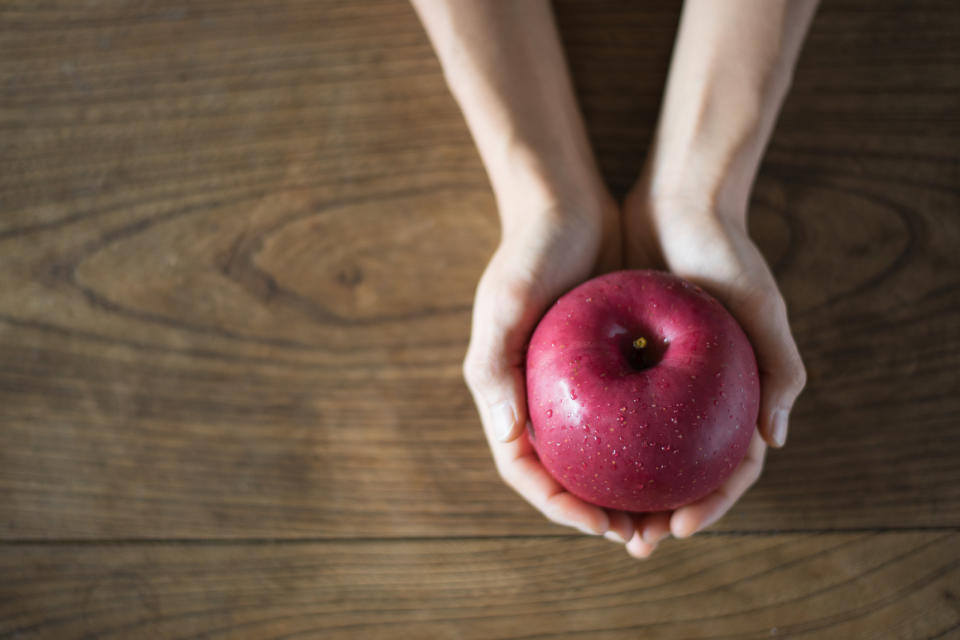You've probably been washing apples wrong
When perusing your local supermarket, where do you gravitate first? The deli? Bakery? Produce aisle? If oranges, grapes and apples are regulars on your grocery list, you need to take note. With the latter being most commonly listed on the Environmental Working Group’s (EWG) Dirty Dozen list, ensuring you remove residual pesticides is important.. This year, apples were listed as number four when it comes to produce with the highest amount of pesticide residue – just behind strawberries, spinach and nectarines.
Why are apples particularly pesticide-laden?
“Apples tend to have the most pesticides because of the chemicals applied to the crop before and after harvest to preserve them longer,” explains the EWG.
Supermarkets clean fruits and vegetables to remove dirt, but pesticides often squeak by in the cleaning process. While we all have different methods of washing our favourite produce – whether it’s a quick buffing with your sleeve or rinsing under a tap – a new study from the University of Massachusetts, Amherst, has found a new way to cleanse apples that ensures all pesticide residue is removed.
And the technique is quite simple: soak the fruit in a baking soda solution before rinsing.
ALSO SEE: EWG adds pears and potatoes to its ‘Dirty Dozen’ list of foods you should always buy organic

In the study, researchers tried three different washing methods on apples which had been previous sprayed with the two most common pesticides. After leaving the pesticides on the apples for 24 hours, the apples were washed in the bleach solution used by supermarkets, plain water, and the baking soda and water combination.
In just two minutes, the baking soda solution had removed most of the pesticide residue, with water coming in second and the bleach solution coming in last. After 12-15 minutes, the baking soda solution had removed all remaining pesticide residue.
To try out this method for yourself, dissolve one teaspoon of baking soda for every 500 mL of water, soak the fruit for at least two minutes then rinse with water.
So what does this mean for your other favourite fruit?
Pears
When it comes to pears, according to NPR, the best way to remove any residual pesticides is to create a vinegar solution (one part vinegar, three parts water) and spray the fruit with the solution, let it rest then rinse with cold water. This method applies to most smooth-skinned fruits.
ALSO SEE: Pesticides in produce linked to women not getting pregnant with IVF
Grapes
Grapes are best cleaned when the agents of both baking soda and salt are combined. Organic website Nature’s Nurture suggests first removing the grapes from the stem, placing them in a shallow bowl, sprinkling 1-2 teaspoons of salt then 1-2 teaspoons of baking soda and shaking the bowl vigorously to coat. The baking soda and salt will scrub the grapes, then you can rinse with cold water, lightly rubbing the grapes to remove any trace granules.
Strawberries and raspberries
According to The Spruce, washing strawberries – which holds the No. 1 spot on the Dirty Dozen list – is tricky business due to their sponge-like nature. If you want your berries to keep, only wash them when you’re planning to eat them. According to Healthy Natural World, the best way to wash strawberries is by soaking them in a water and vinegar solution, similar to pears. Let the berries sit for 15-20 minutes in the solution, then rinse. You can use this same soak and rinse routine with raspberries.
Peaches
Peaches also employ the same water and vinegar soak, followed by a rinse of cold water. However, these soft-skinned fruit require a bit more attention – be sure to massage the fruit under the cold water rinse, ensuring the solution reaches all crevices of the fruit.
Let us know what you think by commenting below and tweeting @YahooStyleCA!
Follow us on Twitter and Instagram.



